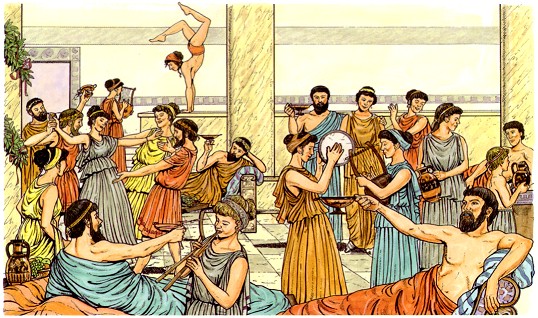
A symposium, or drinking party, in ancient Greece.
The women are hetairae and auletrides, the highest
classes of prostitutes of the day.
More than 2,000 years ago, prostitutes exerted a profound influence on the very foundations of Western Civilization; they were central figures in the art, literature, philosophy, society, and government of Ancient Greece.

Beginning after the time Solon was made lawgiver (594 B.C.), three officially recognized classes of prostitutes existed in Greece: the dicteriades, auletrides, and hetairae.
The lowest class, the dicteriades, worked in brothels called dicteria. At first the dicteria were operated by the municipal government; later they became private enterprises that paid taxes. The dicteriades were educated only in sexual technique (if at all) and the price charged for their services was small. But these ladies were immensely popular, and their combined earnings brought substantial revenues to the state. In Solon's lifetime they financed the construction of a temple of worship dedicated to Aphrodite.
The middle class of prostitutes, the auletrides (literally, "flute-players"), were lovely and accomplished musicians, singers, dancers, strippers, and prostitutes. According to legend, the most famous auletrides charged as much as two talents (many thousands of dollars) or 50 pieces of gold for a night's work at an Athenian banquet. And they sometimes so aroused such frenzied passion that their audience literally showevered them with valuable rings and jeweled ornaments. Indeed, the most successful auletrides accumulated wealth and renown to rival the hetairae.
The most famous auletride was Lamia, who, after being the delight of Alexandria and of King Ptolemy for two decades, was taken with the city by Demetrius of Macedon, and rose to the rank of his mistress. Through her skills of seduction, she soon ruled Demetrius and, through him, Athens. The Athenians built a temple in her honor, even deifying her under the name "Aphrodite Lamia".
In general, however, the hetairae were the most important women in Greece, and the most important sex workers in the entire history of Earth. Unlike "respectable" Athenian matrons, hetairae were thoroughly educated and free to leave the confines of the home to see plays, attend banquets, or debate philosophy and politics with the most learned men.
|
|
in Brief: Sappho is best known as a poet and lesbian, but due to her erotic writings and because she operated a gynaceum like Aspasia's, historians believe she was also a hetaira. Pithionice from Athens became the mistress of Alexander the Great's treasurer Harpalus, and governed Babylon at his side; upon her death, Harpalus ordered the construction of a magnificent tomb in her honor. The philosopher Epicurus was one of the many clients of Leontium; her writings earned the praise of Cicero. The playwright Sophocles enjoyed the services of Theoris and of Archippa, who was his sole heir. Thais of Athens accompanied Alexander the Great on his Persian campaign; she married his general, Ptolemy, who became king of Egypt, and they founded the Lagid dynasty. |
Phryne's friend Bacchis was at the height of her fame and charms when she heard the orator Hyperides speak. Smitten, she immediately became his mistress. When Phryne was tried for "impiety" for impersonating Aphrodite in the nude during public festivals, Bacchis and the auletride Myrrhina convinced Hyperides to defend her. The stakes were high: Phryne could well have been sentenced to death. Hyperides was clearly losing the case when, in desperation, he tore open Phryne's clothing to reveal her breasts to the judges. They acquitted her, concurring with his argument that such divine beauty could hardly insult the gods. Hyperides composed a splendid oration honoring Bacchis after her death; it remains one of the most eloquent and tender works in all Greek literature.
Lais, a Sicilian by birth, was sold into slavery when her city was captured. The painter Apelles, struck by her beauty, bought her, gave her a superb education in his own household, set her free, and established her at Corinth--one of the largest trade centers and a hub of prostitution. Lais soon rose to the first rank in her career, and could pick and choose among her clients. She rejected the staggering sum offered by the orator Demosthenes, yet waived her fee for the poor, ragged cynic Diogenes of "I am looking for an honest man" fame. She generously spent her earnings on improving Corinth, and modeled for a statue at the request of the city's grateful citizens.
The erudite hetaira Aspasia founded a renowned gynaceum--a school for hetairae--at Athens. She emphasized intellectual studies, and lectured publicly on rhetoric and philsophy. Socrates himself brought his friends and students to hear her speak; she thus influenced his ideas as well as those of Plato and other great philosophers. Like Lamia, Aspasia also became the unofficial ruler of Athens through her lover (Pericles in this case). She wrote a magnificent eulogy upon his death.
These are just samples of the many accomplishments of the hetairae. They speak a
message across the centuries: given opportunities instead of oppression, prostitutes
can achieve as much as the best of us.
|
to "The Pyramid Builder" |
to the Hooker Heroes table of Contents |
to The World of the Wondersmith |